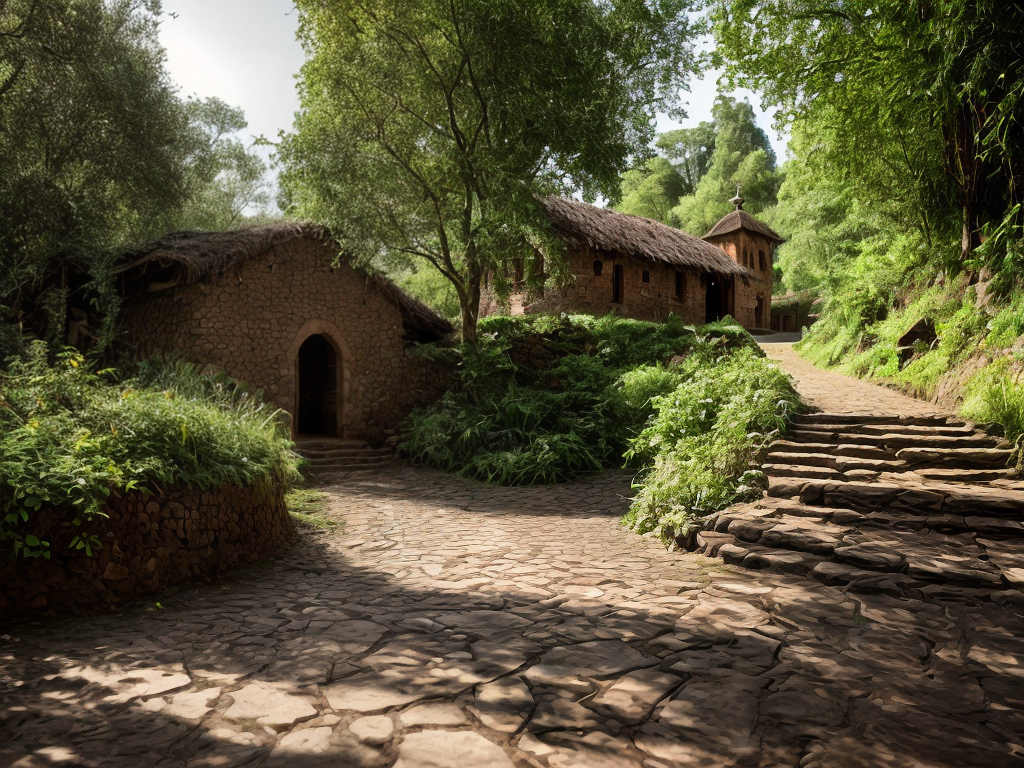Have you ever wondered if it’s possible to plan your dream vacation in Lalibela? Well, I’m here to tell you that not only is it possible, but it’s also a fantastic choice for an unforgettable getaway. Lalibela, located in the northern part of Ethiopia, is a hidden gem brimming with rich history, stunning landscapes, and awe-inspiring rock-hewn churches. In this guide, we will explore the best time to visit, top attractions to explore, tips for choosing the right accommodation, transportation options, must-try local cuisine, budgeting advice, language and communication tips, local customs and etiquette, and other useful travel tips to ensure your dream vacation becomes a reality. So, let’s embark on this journey together and discover the wonders of Lalibela!
Best Time to Visit Lalibela
The best time to visit Lalibela is during the dry season, which typically runs from October to March. This is when the weather in Lalibela is most pleasant, with mild temperatures and little to no rainfall. The dry season offers clear skies and sunny days, making it ideal for exploring the ancient rock-hewn churches and the stunning landscapes that surround the town.
During this time, temperatures in Lalibela range from around 20 to 25 degrees Celsius (68 to 77 degrees Fahrenheit) during the day, dropping slightly at night. It is important to note that Lalibela is located at an altitude of over 2,500 meters (8,200 feet), so the nights can get chilly, especially in the later months of the dry season. It is advisable to pack layers and a light jacket to stay comfortable during the cooler evenings.
Another advantage of visiting Lalibela during the dry season is that the chances of encountering rain are minimal. This means that you can explore the historic sites without worrying about getting wet or having to navigate muddy paths. The dry weather also allows for better visibility, enhancing the overall experience of visiting Lalibela’s architectural wonders.
Top Attractions in Lalibela
Now let’s explore the captivating attractions that make Lalibela a must-visit destination for travelers from around the world. Lalibela is not only famous for its rock-hewn churches but also for its vibrant culture and rich history. One of the top attractions in Lalibela is the UNESCO World Heritage Site, Lalibela Rock-Hewn Churches. These incredible structures were carved out of solid rock in the 12th century and are considered one of the wonders of the world. Visitors can explore the intricate architecture and religious significance of these churches, making it a truly unique experience.
Aside from the churches, Lalibela is also known for its bustling local markets. Here, you can find a wide variety of local handicrafts, including traditional clothing, woven baskets, and hand-carved wooden statues. These markets are not only a great place to find souvenirs, but they also offer an opportunity to immerse yourself in the local culture and interact with the friendly locals.
When it comes to dining, Lalibela offers a range of options to satisfy your taste buds. Some of the best restaurants in town serve traditional Ethiopian cuisine, known for its rich flavors and unique spices. Whether you’re craving injera, a sourdough flatbread, or doro wat, a spicy chicken stew, Lalibela has something for everyone. Don’t forget to try the local honey wine, a popular drink in the region.
Choosing the Right Accommodation
When it comes to choosing the right accommodation for your dream vacation in Lalibela, there are a few key points to consider. Firstly, you’ll want to explore the different types of accommodations available, such as hotels, guesthouses, or lodges, to find the option that best suits your preferences and budget. Additionally, the location of your accommodation is crucial, as you’ll want to be close to the main attractions and amenities in Lalibela to make the most of your stay.
Types of Accommodations
Choosing the right accommodation for your dream vacation in Lalibela is a crucial step in ensuring a comfortable and memorable experience. When it comes to choosing accommodations in Lalibela, location considerations are important. There are various types of accommodations available, ranging from luxury hotels to budget guesthouses. If you want to be close to the historical sites, it’s best to choose a hotel located in the town center. This will give you easy access to the famous rock-hewn churches and other attractions. On the other hand, if you prefer a quieter and more secluded experience, there are options outside the town center that offer stunning views of the surrounding landscape. No matter your preference, Lalibela offers a range of accommodations to suit every traveler’s needs.
Location Considerations
For a comfortable and memorable experience in Lalibela, it is crucial to carefully consider the location when choosing the right accommodation. Here are four important factors to keep in mind:
-
Proximity to the Best Places to Eat in Lalibela: To truly immerse yourself in the local culture and cuisine, stay in a hotel or guesthouse that is conveniently located near the best restaurants and cafes. This way, you can easily explore the vibrant food scene and indulge in traditional Ethiopian dishes.
-
Access to Popular Hiking Trails near Lalibela: If you’re an outdoor enthusiast, choosing accommodation near popular hiking trails is a must. Lalibela is surrounded by breathtaking landscapes and ancient rock-hewn churches, making it an ideal destination for hiking and exploring nature.
-
Safety and Security: Ensure that the chosen accommodation is located in a safe and secure area. Look for accommodations with reliable security measures and reputable reviews to ensure peace of mind during your stay.
-
Convenient Transportation: Consider staying near transportation hubs, such as airports or bus stations, to make it easier to explore Lalibela and its surrounding areas.
Transportation Options in Lalibela
When it comes to getting around in Lalibela, there are a few transportation options to consider. One option is to take local taxis or buses, which can be a more budget-friendly choice. Another option is to hire a private driver, which offers convenience and flexibility.
Local Taxis and Buses
Local taxis and buses in Lalibela provide convenient and affordable transportation options for exploring the city and its surrounding attractions. Here are four things to know about local transportation in Lalibela:
-
Taxis: Taxis are readily available in Lalibela and can be hailed from the street or found at designated taxi stands. They are a convenient way to navigate the city and are especially useful for visiting the famous rock-hewn churches.
-
Shared Taxis: Shared taxis are a popular choice among locals and budget-conscious travelers. These taxis follow specific routes and pick up multiple passengers along the way. Sharing a taxi not only saves money but also provides an opportunity to interact with the friendly locals.
-
Buses: Lalibela has a reliable bus system that connects the city with nearby towns and villages. Buses are a great option for day trips or exploring the countryside. They offer a unique glimpse into the local way of life and stunning views of the Ethiopian landscape.
-
Fare Negotiation: When using local taxis or buses, it’s important to negotiate the fare in advance. While taxis usually have meters, they may not always be used. It’s best to agree on a price before starting the journey to avoid any confusion or disagreements.
With these public transportation options, getting around Lalibela and experiencing its rich cultural heritage has never been easier or more affordable.
Hiring a Private Driver
Hiring a private driver in Lalibela offers a convenient and personalized transportation option for exploring the city and its surrounding areas. One of the main benefits of hiring a private driver is the flexibility it provides. You can customize your itinerary and visit places that are not easily accessible by public transport. Additionally, having a private driver ensures that you can travel at your own pace and have the freedom to stop whenever you want to take pictures or explore a particular area. To find a reliable driver, it is advisable to ask for recommendations from locals or fellow travelers. You can also check online travel forums or contact local tour operators for suggestions. It is important to communicate your specific needs and expectations to the driver to ensure a smooth and enjoyable experience.
Must-Try Local Cuisine in Lalibela
Indulge in the delectable flavors of Lalibela’s local cuisine, a culinary experience that will transport your taste buds to new heights. When in Lalibela, make sure to try these traditional Ethiopian dishes at popular local restaurants:
-
Injera: This spongy, sourdough flatbread is a staple in Ethiopian cuisine. Made from fermented teff flour, injera serves as both a utensil and a base for various dishes. Tear off a piece and use it to scoop up flavorful stews and vegetables.
-
Doro Wat: This spicy chicken stew is a must-try in Lalibela. Cooked with a blend of aromatic spices, berbere (a spicy chili powder), and served with injera, doro wat is a rich and hearty dish that will leave you craving for more.
-
Kitfo: For the adventurous foodies, kitfo is a must-order. This traditional Ethiopian dish consists of minced raw beef seasoned with spices and served with injera or bread. Don’t worry, it’s perfectly safe to eat and bursting with flavors.
-
Tibs: If you’re a fan of grilled meat, don’t miss out on tibs. This dish features tender pieces of marinated beef, lamb, or chicken, cooked with onions, garlic, and spices. Served with injera or bread, tibs is a savory delight that showcases the unique flavors of Lalibela.
Explore Lalibela’s local restaurants to savor these traditional Ethiopian dishes. From the tangy injera to the fiery doro wat, each bite will take you on a journey through the vibrant culinary heritage of the region. Get ready to satisfy your cravings and experience the true essence of Lalibela’s local cuisine.
Exploring the Rock-Hewn Churches
After savoring the flavors of Lalibela’s local cuisine, it’s time to embark on an extraordinary journey through the awe-inspiring Rock-Hewn Churches. Lalibela is famous for its remarkable churches carved out of solid rock, dating back to the 12th century. These churches are not only religious sites but also architectural wonders that attract visitors from all over the world.
One of the must-visit churches in Lalibela is the Church of St. George, also known as Bete Giyorgis. This church is carved in the shape of a cross and is considered one of the most beautiful and well-preserved rock-hewn churches in the world. As you approach the church, you will be amazed by its intricate carvings and the sheer scale of the structure.
Another must-see church is the Church of St. Mary, also known as Bete Mariam. This church is unique because it is connected to other churches through underground tunnels, creating a labyrinth-like experience for visitors. Inside the church, you can admire the impressive religious paintings and artifacts that have been preserved for centuries.
While exploring the rock-hewn churches, take the time to visit the local crafts and markets in Lalibela. The town is known for its vibrant markets where you can find a variety of traditional crafts, including hand-woven textiles, pottery, and jewelry. These markets offer a glimpse into the rich cultural heritage of Lalibela and provide an opportunity to support local artisans.
To make the most of your visit, consider hiring a knowledgeable guide who can provide insights into the history and significance of the rock-hewn churches. They can also recommend the top restaurants in Lalibela, where you can indulge in delicious Ethiopian cuisine after a day of exploration. Immerse yourself in the beauty and spirituality of Lalibela’s rock-hewn churches, and you will leave with unforgettable memories of this ancient Ethiopian treasure.
Cultural Experiences in Lalibela
When planning a trip to Lalibela, there are several cultural experiences that should not be missed. One of the highlights is attending a local festival or witnessing traditional Ethiopian traditions, which provide a unique glimpse into the vibrant culture of the region. Additionally, Lalibela is home to UNESCO World Heritage Sites, including the famous rock-hewn churches, which are not only architectural marvels but also hold deep religious significance. Lastly, exploring the local cuisine and trying traditional Ethiopian dishes is a must, as Lalibela offers a rich and flavorful culinary experience.
Local Festivals and Traditions
Throughout the year, Lalibela is alive with vibrant local festivals and traditions that offer a unique cultural experience for visitors. Here are four must-see cultural highlights in Lalibela:
-
Local Music and Dance: Immerse yourself in the rhythmic beats and energetic movements of traditional Ethiopian music and dance. From the melodic sound of the masenqo (a single-stringed bowed instrument) to the intricate footwork of the eskista dance, you’ll be captivated by the rich cultural heritage of Lalibela.
-
Traditional Clothing and Accessories: Witness the beauty and craftsmanship of traditional Ethiopian clothing and accessories. The vibrant colors and intricate designs of the habesha kemis (Ethiopian dress) and the graceful elegance of the shemma (Ethiopian scarf) will transport you to a different time and place.
-
Meskel Festival: Join in the festivities of the Meskel Festival, a religious celebration that commemorates the finding of the True Cross by Queen Helena in the 4th century. Experience the mesmerizing procession, adorned with bright yellow daisies and a large bonfire, as locals sing and dance in joyful celebration.
-
Timkat Festival: Be part of the joyous Timkat Festival, a commemoration of the baptism of Jesus in the Jordan River. Witness the colorful processions, as priests carry replicas of the Ark of the Covenant to the river for a symbolic reenactment of the baptism. Join the locals in their traditional white clothing and experience the spiritual atmosphere of this sacred event.
Immerse yourself in the rich cultural tapestry of Lalibela and create unforgettable memories as you participate in these local festivals and traditions.
UNESCO World Heritage Sites
Lalibela boasts a number of UNESCO World Heritage Sites that offer visitors a captivating glimpse into the rich cultural history of the region. These sites are not only landmarks of architectural excellence but also cultural experiences that transport you back in time. Let’s take a look at some of the most notable UNESCO World Heritage Sites in Lalibela:
| Site | Description | Highlights |
|---|---|---|
| Lalibela Churches | A complex of 11 rock-hewn churches, dating back to the 12th century, carved out of solid volcanic rock. These churches are still active places of worship and are considered one of the world’s greatest religious wonders. | Marvel at the intricate carvings and architectural mastery of these ancient churches. Explore the underground tunnels that connect them and witness religious ceremonies that have been taking place for centuries. |
| Bete Giyorgis | Also known as the Church of St. George, this standalone monolithic church is the most famous in Lalibela. It is shaped like a cross and carved entirely out of a single rock. | Admire the impressive craftsmanship of the church and marvel at its unique design. Take part in the annual pilgrimage to Bete Giyorgis, where thousands of Ethiopian Orthodox Christians gather to celebrate. |
| Na’akuto La’ab | This cave church is located on the outskirts of Lalibela and is known for its stunning frescoes depicting biblical scenes. | Immerse yourself in the vibrant colors and intricate details of the frescoes. Learn about the stories they depict and the symbolism behind them. |
| Ashetan Maryam | A small hilltop church that offers breathtaking views of the surrounding countryside. It is a peaceful and serene place to visit, away from the bustling town center of Lalibela. | Take a moment to meditate and soak in the tranquility of Ashetan Maryam. Enjoy the panoramic views and the sense of spirituality that emanates from this sacred place. |
Visiting these UNESCO World Heritage Sites in Lalibela will provide you with a deeper understanding of the region’s cultural heritage and leave you with memories that will last a lifetime.
Traditional Ethiopian Cuisine
Exploring the UNESCO World Heritage Sites in Lalibela is just the beginning of immersing yourself in the rich cultural experiences of the region, including indulging in the traditional Ethiopian cuisine that is sure to tantalize your taste buds. Here are four must-try aspects of traditional Ethiopian cuisine:
-
Traditional Ethiopian spices: Ethiopian cuisine is known for its bold and flavorful spices. From the rich flavors of berbere, a spice blend made from chili peppers, garlic, ginger, and more, to the aromatic notes of mitmita, a spicy seasoning made from chili peppers and spices like cardamom and cloves, the use of traditional spices adds depth and complexity to Ethiopian dishes.
-
Injera: Injera is a staple in Ethiopian cuisine. It is a sourdough flatbread with a slightly tangy taste and a spongy texture. It is typically used as a base for various stews and dishes, and it is also used as a utensil to scoop up food.
-
Kitfo: Kitfo is a traditional Ethiopian dish made from minced raw beef that is seasoned with traditional spices and served with injera. It is often enjoyed with a side of cottage cheese and vegetables. The dish is rich in flavor and has a unique texture that is sure to delight your palate.
-
Ethiopian coffee ceremony: The Ethiopian coffee ceremony is a cultural experience that is not to be missed. It is a traditional ritual where coffee beans are roasted, ground, and brewed right in front of you. The aroma of freshly roasted coffee fills the air as you enjoy the rich and flavorful Ethiopian coffee, often served with snacks like popcorn or roasted barley.
Indulging in traditional Ethiopian cuisine is a wonderful way to immerse yourself in the local culture of Lalibela. From the aromatic spices to the unique dishes and the traditional coffee ceremony, you are sure to have a truly unforgettable culinary experience.
Outdoor Activities in Lalibela
When visiting Lalibela, outdoor enthusiasts will find a plethora of exhilarating activities to engage in. The rugged terrain and breathtaking landscapes make it an ideal destination for adventure seekers. One of the most popular activities in Lalibela is rock climbing. With its unique rock formations and challenging routes, it offers a thrilling experience for climbers of all levels. Whether you are a beginner or an experienced climber, there are plenty of options to choose from. The rock faces in Lalibela provide a variety of challenges, from easy climbs for beginners to more difficult routes for the experienced climber.
In addition to rock climbing, Lalibela also offers a wide range of hiking trails. The surrounding mountains and valleys are a hiker’s paradise, with trails that cater to all levels of fitness and experience. From leisurely walks through the countryside to challenging treks up steep mountain paths, there is something for everyone. The hiking trails in Lalibela offer stunning views of the surrounding landscape, including waterfalls, lush forests, and ancient monasteries. It is a great way to immerse yourself in the natural beauty of the region and discover hidden gems along the way.
For those who prefer a more adrenaline-fueled adventure, Lalibela also offers opportunities for outdoor activities such as mountain biking and horseback riding. Explore the rugged terrain on two wheels or experience the thrill of galloping through the countryside on horseback. These activities allow you to experience the beauty of Lalibela in a unique and exciting way.
Shopping for Souvenirs in Lalibela
While visiting Lalibela, travelers have the opportunity to browse a diverse selection of souvenirs to take home as mementos of their unforgettable trip. The town is renowned for its traditional markets and vibrant ethnic crafts, offering an authentic shopping experience. Here are four must-visit spots for souvenir shopping in Lalibela:
-
Lalibela Market: Located in the heart of the town, Lalibela Market is a bustling hub where locals and tourists come together. Here, you can find a wide variety of souvenirs, including traditional clothing, handmade jewelry, and beautifully woven textiles. Don’t forget to haggle for the best prices and take a piece of Lalibela’s vibrant culture home with you.
-
Bet Gabriel Rufael: This small craft center is a hidden gem in Lalibela. It showcases the work of local artisans who specialize in intricate wood carvings, pottery, and leather goods. You can watch these skilled craftsmen in action and even participate in workshops to learn their traditional techniques.
-
Asheton Maryam Souvenir Shop: Located near the Asheton Maryam Monastery, this charming shop offers a wide selection of religious artifacts and icons. From hand-carved crosses to beautifully painted icons, you can find unique and spiritual souvenirs to cherish.
-
Sunday Market: If you happen to be in Lalibela on a Sunday, don’t miss the vibrant Sunday Market. This weekly event brings together villagers from surrounding areas, creating a lively atmosphere. Here, you can find an array of local produce, spices, and traditional handicrafts. It’s the perfect place to immerse yourself in the local culture and find one-of-a-kind souvenirs.
Shopping for souvenirs in Lalibela is not just about buying trinkets; it’s an opportunity to support local artisans and bring a piece of Ethiopia’s rich heritage back home with you. So, don’t forget to explore these traditional markets and take home something truly special.
Planning Your Itinerary
When planning your itinerary in Lalibela, there are a few key points to consider. First, make sure to visit the must-see attractions such as the rock-hewn churches and the monolithic churches. Second, explore the various day trip options available, such as hiking in the nearby mountains or visiting the ancient churches in the surrounding villages. Lastly, be mindful of time management and allocate enough time to fully experience each site while also allowing for relaxation and exploration of the local culture.
Must-See Attractions
To make the most of your trip to Lalibela, be sure to include these must-see attractions in your itinerary:
-
The Rock-Hewn Churches: These awe-inspiring structures carved out of solid rock are Lalibela’s most famous landmarks. Explore the intricate architecture and marvel at the religious significance of these UNESCO World Heritage sites.
-
Yemrehanna Kristos Church: A hidden gem nestled in the nearby hills, this ancient church is known for its unique architectural style and beautiful frescoes. Take a short hike to reach this lesser-known gem and experience the tranquility of its surroundings.
-
Asheton Maryam Monastery: For breathtaking panoramic views of Lalibela and its surroundings, hike up to this mountaintop monastery. Witness the stunning sunset or sunrise over the rugged landscape, and immerse yourself in the spiritual atmosphere of this sacred place.
-
The Lalibela Market: Immerse yourself in the local culture and vibrant atmosphere of the bustling Lalibela Market. Explore the stalls filled with traditional crafts, textiles, and authentic Ethiopian souvenirs. Engage with friendly locals, taste delicious local delicacies, and take home a piece of Lalibela’s vibrant spirit.
Make sure to add these must-see attractions to your Lalibela itinerary for an unforgettable and enriching experience.
Day Trip Options
After exploring the must-see attractions of Lalibela, it’s time to plan your itinerary and discover the exciting day trip options available in this captivating Ethiopian destination. There are several options for exploring Lalibela’s surroundings and immersing yourself in the rich culture and natural beauty of the region. One option is to visit the Yemrehanna Kristos Church, located about 42 kilometers northeast of Lalibela. This monolithic church, dating back to the 11th century, is carved into a cave and known for its unique architectural style. Another option is to take a trip to the Asheton Maryam Monastery, situated on a hilltop overlooking Lalibela. This spiritual site offers breathtaking views of the town and a chance to learn about the religious practices of the Ethiopian Orthodox Church. Lastly, you can embark on a journey to the beautiful Blue Nile Gorge, one of the deepest canyons in the world. This natural wonder is a paradise for hikers and nature enthusiasts, with its lush vegetation, cascading waterfalls, and stunning landscapes. With these day trip options, you can truly immerse yourself in the wonders of Lalibela and create unforgettable memories.
| Day Trip Options | Description |
|---|---|
| Yemrehanna Kristos | Visit this 11th-century monolithic church carved into a cave and marvel at its unique architectural style. |
| Asheton Maryam | Explore the hilltop monastery with panoramic views of Lalibela, and learn about the Ethiopian Orthodox Church. |
| Blue Nile Gorge | Experience the natural beauty of one of the world’s deepest canyons, with lush vegetation and cascading waterfalls. |
Time Management Tips
Looking to make the most of your time in Lalibela? Here are four time management strategies to help you prioritize your activities and create an efficient itinerary:
-
Research and Plan Ahead: Before your trip, do some research on the attractions and activities in Lalibela. Make a list of must-see sites and experiences to prioritize during your visit.
-
Allocate Time Wisely: Determine how much time you want to spend at each attraction and factor in travel time between locations. Be realistic about what you can accomplish in a day and allow for flexibility in case unexpected opportunities arise.
-
Combine Similar Activities: Look for opportunities to combine similar activities or attractions that are located in close proximity. This will help you save time and maximize your experience.
-
Take Breaks and Rest: While it’s important to make the most of your time, don’t forget to schedule breaks and rest periods throughout the day. This will ensure that you have enough energy to fully enjoy each activity.
Safety and Health Tips for Lalibela
For a safe and healthy vacation experience in Lalibela, it is important to be aware of some key tips. Lalibela is a beautiful destination with rich cultural heritage and stunning rock-hewn churches. However, like any other travel destination, it is essential to take safety precautions and follow health guidelines to ensure a worry-free trip. Here are some important tips to consider:
| Safety Precautions | Health Guidelines |
|---|---|
| Keep your belongings secure | Stay hydrated and drink bottled water |
| Be cautious of your surroundings | Pack necessary medications and a basic first aid kit |
| Use reputable tour operators and guides | Protect yourself from mosquito bites by wearing insect repellent |
| Familiarize yourself with local laws and customs | Eat at clean and reputable restaurants |
| Travel in groups, especially at night | Practice good personal hygiene, including regular handwashing |
Budgeting for Your Lalibela Vacation
Now that you have taken the necessary safety and health precautions for your Lalibela vacation, let’s turn our attention to budgeting for this unforgettable experience. Here are four essential tips to help you manage your finances while exploring the wonders of Lalibela.
-
Familiarize Yourself with the Local Currency: The official currency in Ethiopia is the Ethiopian Birr (ETB). It is advisable to familiarize yourself with the exchange rate before your trip to have a better understanding of the value of your money. While US dollars are widely accepted in Lalibela, it is still recommended to carry some local currency for smaller transactions.
-
Plan Your Money Exchange: Lalibela offers several options for currency exchange, including banks and authorized exchange bureaus. It is advisable to exchange your money at these official establishments to ensure fair rates and avoid scams. Additionally, be aware that credit card acceptance may be limited, so it is wise to carry enough cash for your daily expenses.
-
Budget for Accommodation and Meals: Lalibela offers a range of accommodation options, from budget-friendly guesthouses to luxury resorts. Research and compare prices beforehand to find the best option that fits your budget. Similarly, local restaurants and street food stalls offer delicious and affordable meals that allow you to experience the local cuisine without breaking the bank.
-
Consider Transportation Costs: When budgeting for your Lalibela vacation, don’t forget to include transportation expenses. Whether you choose to hire a private driver, use public transportation, or rely on organized tours, it is essential to account for these costs to ensure a smooth and hassle-free travel experience.
Language and Communication in Lalibela
Language and communication in Lalibela can be an enriching experience as you immerse yourself in the local culture and interact with the friendly residents. While English is widely spoken in Lalibela, it is important to note that there may still be some language barriers, especially when venturing into more remote areas or interacting with older locals.
The official language of Ethiopia is Amharic, but Lalibela has its own local dialect, known as Lasta. Learning a few basic phrases in Lasta can go a long way in breaking down these language barriers and connecting with the locals on a deeper level. Simple greetings like “Selam” (hello) or “Ameseginalehu” (thank you) can make a big difference in making locals feel appreciated and respected.
If you are not familiar with Amharic or Lasta, don’t worry. Many residents of Lalibela are accustomed to interacting with tourists and are patient and understanding. They will often go out of their way to ensure effective communication, using gestures, facial expressions, and even drawings to convey their message.
Additionally, it can be helpful to carry a phrasebook or use translation apps on your smartphone to facilitate communication. These tools can assist you in navigating menus, asking for directions, or negotiating prices.
It’s also worth mentioning that Lalibela is a deeply religious town, and therefore, it is essential to be respectful when communicating with the locals. Understanding their customs and traditions will not only enhance your experience but also foster a sense of mutual respect and appreciation.
Local Customs and Etiquette in Lalibela
As a traveler in Lalibela, it is important to understand and respect the local customs and etiquette in order to fully immerse yourself in the rich cultural experience. Here are four key aspects of Lalibela cultural traditions and local etiquette to keep in mind:
-
Dress modestly: Lalibela is a deeply religious place, and it is important to dress respectfully. Both men and women should avoid wearing revealing clothing, and women should cover their shoulders and knees when visiting churches or other religious sites.
-
Remove your shoes: When entering a church or someone’s home, it is customary to remove your shoes as a sign of respect. Be mindful of this practice and follow suit when you visit these places.
-
Greet with respect: In Lalibela, greetings are an important part of the local culture. When meeting someone, it is customary to shake hands and exchange pleasantries. Additionally, it is considered polite to greet older individuals first as a sign of respect.
-
Ask for permission: If you wish to take photographs of people or religious sites, always ask for permission first. It is important to respect people’s privacy and beliefs. Additionally, some areas may have specific rules regarding photography, so it is always best to seek guidance before snapping away.
Useful Travel Tips for Lalibela
To enhance your travel experience in Lalibela, here are some useful tips to keep in mind. When traveling to Lalibela, it is important to take certain safety precautions. While the city is generally safe, it is always wise to be cautious and aware of your surroundings, especially when exploring unfamiliar areas. It is recommended to avoid walking alone at night and to keep your belongings secure. Additionally, it is advisable to carry a copy of your passport and important documents with you, while leaving the originals in a safe place.
Another important aspect to consider when traveling to Lalibela is the local currency exchange. The official currency in Ethiopia is the Ethiopian Birr (ETB), and it is recommended to exchange your money at authorized banks or exchange bureaus. It is also a good idea to carry small denominations of ETB, as some shops and vendors may not have change for larger bills.
Furthermore, it is worth noting that Lalibela is situated at a high altitude, so it is important to acclimatize properly to avoid altitude sickness. It is recommended to drink plenty of water, take it easy upon arrival, and gradually increase your physical activity.
Lastly, it is always beneficial to learn a few basic phrases in Amharic, the local language, as it can go a long way in connecting with the locals and showing respect for their culture. Simple greetings and thank yous can make a big difference in creating a positive and memorable travel experience.







